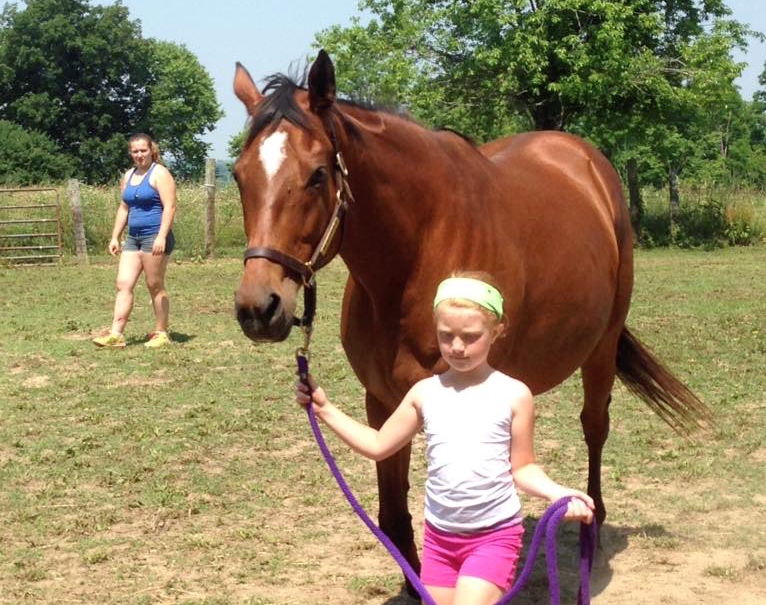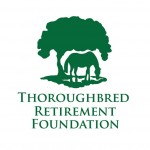Through the years, Off-Track Thoroughbreds has chronicled stories of horses who survive against the odds.
Often times, the horses are malnourished to the point of starvation, and so depleted they appear to be hopeless cases. And yet, they survive when even the brightest minds in veterinarian medicine caution owners to prepare for the worst.
Thoroughbreds like Crowning Glory, who was rescued by the South Florida SPCA with a body condition of 1 on the Henneke Horse Body Score System, and Jo Jo Gypsy, who was rescued by Jeanne Mirabito, of Our Mims Retirement Haven in the same sorry condition, are today nearly unrecognizable as both blossom with good health.
In this week’s second installment of Veterinary Answers on the subject of re-feeding starved Thoroughbreds, Dr. Laurie Metcalfe, DVM associate with Rood & Riddle, offers insights on the delicate process of re-feeding a starved horse. Please see the first installment here: http://offtrackthoroughbreds.com/2015/06/15/veterinary-advice-for-feeding-a-starved-horse/
Q: What foods, supplements, do you recommend? And which would you recommend against?

Hopefully Mine was rescued by the South Florida SPCA and gradually re-fed, before she was adopted by volunteer Susie Martell. Martell carried on her careful care.
Good quality hay is of utmost importance, in addition to fresh clean water. Good quality pasture introduced slowly, and no concentrates for the first few weeks. The key is everything gradual. For older horses with poor dentition that may not utilize their forage as efficiently, I like to use complete feeds (senior) soaked, especially lower carbohydrate, higher fat. This too must be introduced gradually- small amounts frequently to begin, working up to larger amounts less often. The high carbohydrate sweet feeds are not recommended initially as these are the most difficult for a compromised GI tract to digest. Eventually I like these horses out on good quality pasture as much as possible, as this will help them return to a healthy body condition more quickly than anything.
Q: Once a horse has returned to a healthy weight, what type of monitoring should be done?
No big changes— ironically, many of these will become overweight if the amount of feed is not eventually reduced to maintenance. Back off when the horse reaches its goal weight and try to maintain a body condition score between 4-6 (on a 1-9 scale). Maintain their teeth, deworming and vaccination status, and you will be in good shape. Once past the initial crisis period, these former emaciation/malnourished cases do amazingly well.
Q: How often would you recommend calling the vet for a typical starvation case?
A veterinarian is critical to the recovery of these animals and should be consulted immediately for every starvation case.
A veterinarian can assess the overall health and function of vital organs, perform necessary testing, and determine how to implement safe re-feeding (see above).
I am a board member and attending veterinarian for the Kentucky Equine Humane Center (KyEHC) in Nicholasville, Ky., and we see numerous cases like these each year. A veterinarian is immediately consulted for all of them, and a plan formulated for each as an individual. A veterinarian is an important part of the team that it takes to ensure the outcome is successful for as many of these horses as possible.
Q: Is there anything you’d like to add?
Just that these cases are financially, emotionally, and physically challenging and often require a large amount of time and dedication. They can be incredibly rewarding, however keep in mind that even after being placed with a responsible caregiver or well-equipped facility, and put on an appropriate diet, many of these horses still die or experience secondary complications despite our best efforts.

Jo-Jo surprised them all when she regained her strength and health. She is pictured with Jeanne’s granddaughter.
Financially, the money required to rehabilitate in the majority of these cases will not be recouped in any eventual sale, so this should not be a motivation factor for those who choose to take these cases on. Be cognizant of these challenges going into it, and do right by the horse, even if the most humane option may be euthanasia if the situation is too far advanced and the horse is suffering.
This is an emotionally fueled topic, with good reason. Endings can be unbelievably happy, but also tragic- it is important you recognize this before taking on these challenges.




Loretta Gamble- Happy for you and the horse. She will be the best horse you may have, perfect for your granddaughter.
Wow! Those pictures make me cry! It’s horrific to think of what these beautiful creatures have gone through. Thank you to the angels that have the means to rescue and save!!! My biggest dream would be to be able to do this some day! For now I live vicariously through all of you wonderful people!!!
Good care love and affection does wonders, Glad they both have homes and people who care .
Two great stories. My rescues have given back to me more than any resale could do. They are the BEST horses I have ever had . SOOOO worth the work and $ and all keepers!.
The photos are enough to make one cry…good lord but we humans can be savage. This is a very informative article. Thank you!